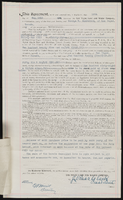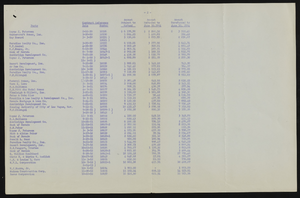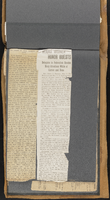Search the Special Collections and Archives Portal
Search Results
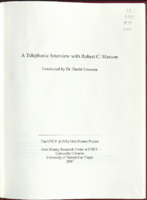
Transcript of interview with Robert C. Maxson by Dr. David Emerson, May 15, 2007
Date
2007-05-15
Archival Collection
Description
Dr. Robert C. Maxson was president of UNLV for ten years, 1984 to 1994. When he arrived, discussions were already under way about developing an engineering school. Certain elements in the community, such as Summa Corporation, were lobbying for such a program here in southern Nevada. Dr. Maxson began receiving printed materials and phone calls about it, and he started putting his fund raising skills to good use. He believes that civic pride in the young university, as well as a sense that an engineering school would be good for business, led many individuals, hotels, and corporations to open their pocketbooks. Locally, Dr. Maxson found generous support from Tom Beam, Nevada Power, the Summa Corporation, and many other businesses and individuals. Since the legislature only meets every two years in northern Nevada, Robert and others made many trips to Carson City that first year to discuss every nuance of the project. He spent considerable time with Senator Bill Raggio, John Marvel, Bill Bilyeu, and other legislators convincing them that Nevada would get its money's worth. He also gives major credit to Las Vegas civic leaders for their influence and the fact that they had rallied behind this cause. Once the funding was approved, Dr. Maxson insisted on and facilitated the accreditation of the program. Faculty members enthusiastically got behind this push and accreditation was achieved in a remarkably short time. The next order of business was funding an honors program for deserving students. Dr. Len Zane was given this project and began recruiting students. Individuals in the private sector were invited to fund academic scholarships, and they responded generously. Dr. Maxson traveled the state attending high school commencements and recruited valedictorians on the strength of offering those students the honors scholarships. Dr. Maxson greatly enjoyed his time as president at UNLV. He feels he was privileged to be part of its growth and expansion, to have worked with enthusiastic, energetic faculty, and to have encouraged the community's desire to get behind the growth of the university.
Text
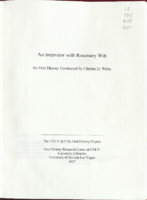
Transcript of interview with Rosemary Witt by Claytee D. White, November 7, 2006
Date
2006-11-07
Archival Collection
Description
Rosemary Witt grew up in the very small town of Columbia, Iowa. She went to a two-room country school in Columbia and attended high school in Knoxville. Her nursing diploma was completed at Iowa Methodist Hospital in Des Moines. She then worked in the operating room for a month or two and switched to pediatrics. When Rosemary's dad fell ill, she moved back to Knoxville to be closer to him and found employment at the VA psychiatric hospital. After five years there, first as staff and then as head nurse, she got the opportunity to attend a nursing program at the University of Iowa which paid tuition and a stipend. She completed her baccalaureate degree, and then worked as an assistant instructor. In the late '60s, Rosemary decided to further her education, and went to the University of Washington in Seattle for her master's in psychiatric nursing. She stayed for three years afterwards to teach on that faculty, and then attended a workshop in Las Vegas in 1971. Rosemary was attracted by the sunshine in Las Vegas, and called UNLV to see if there were any openings. She interviewed and was hired as a psychiatric nurse instructor. In '75 or '76, she decided to pursue her doctorate at the University of Texas in Austin, and persuaded her sister to move to Las Vegas to watch her house and pets while she was away at school. In the many years that she's been at UNLV, Rosemary had served as chair of the nursing program for over thirty of those years. She also served as interim director for a year while a search was conducted for a dean. Today she teaches classes and is involved in research. Rosemary recalls the early days when several disciplines were housed in Frazier Hall. Having spent over thirty years at UNLV, she has seen many changes in the campus and in the city. Today the nursing program has its own school and inhabits most of a large building. She and other instructors are involved in research which improves life for Las Vegans and patients everywhere. She is confident that the nursing school will continue to grow and offer more educational opportunities for students.
Text
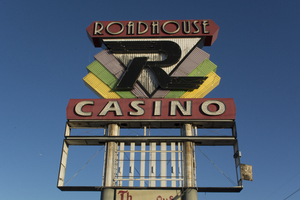
Photographs of Roadhouse Casino sign, Las Vegas (Nev.), March 14, 2017
Date
2017-03-14
2017-09-01
Archival Collection
Description
The Roadhouse Casino sign sits unlit at 2100 North Boulder Highway. Information about the sign is available in the Southern Nevada Neon Survey Data Sheet.
Site address: 2100 N Boulder Hwy
Sign owner: Robert McMackin
Sign details: Roadhouse approved for gaming 1988, Robert McMackin bought the Roadhouse 1992, but it closed 2002. They planned to refurbish and reopen by 2010 but has been in legal trouble and has not reopened.
Sign condition: 2- reader board portion/plastic back lit portion is gone and paint has faded drastically
Sign form: Pylon
Sign-specific description: Big Letters on top "Roadhouse" below Is a Huge Letter "R". Still up but in horrible condition. Reader board is a frame and appears to be scrapped. No upkeep has been made to the sign. There is an array of colors behind the 'R' such as purple, white, yellow and green in a parallel plume shape.
Sign - type of display: Neon
Sign - media: Steel
Sign - non-neon treatments: There must have been plastic on this sign since there is a sign box that would contain it.
Sign environment: This location is on Boulder Hwy. near Sunset Road.
Sign - thematic influences: The letter R in the middle of the sign is remnant of the 1980's car/video game font.
Survey - research locations: Las Vegas Sun Article synopsis https://vegasinc.lasvegassun.com/business/legal/2012/mar/26/city-henderson-reverses-course-roadhouse-casino-li/ Review Journal article https://www.reviewjournal.com/business/casinos-gaming/station-casinos-henderson-settle-roadhouse-dispute/
Survey - research notes: The articles were helpful with finding information on this property since other avenues did not have any information on it.
Surveyor: Wyatt Currie-Diamond
Survey - date completed: 2017-09-01
Sign keywords: Pylon; Neon; Steel; Plastic; Incandescent; Backlit; Back to back
Site address: 2100 N Boulder Hwy
Sign owner: Robert McMackin
Sign details: Roadhouse approved for gaming 1988, Robert McMackin bought the Roadhouse 1992, but it closed 2002. They planned to refurbish and reopen by 2010 but has been in legal trouble and has not reopened.
Sign condition: 2- reader board portion/plastic back lit portion is gone and paint has faded drastically
Sign form: Pylon
Sign-specific description: Big Letters on top "Roadhouse" below Is a Huge Letter "R". Still up but in horrible condition. Reader board is a frame and appears to be scrapped. No upkeep has been made to the sign. There is an array of colors behind the 'R' such as purple, white, yellow and green in a parallel plume shape.
Sign - type of display: Neon
Sign - media: Steel
Sign - non-neon treatments: There must have been plastic on this sign since there is a sign box that would contain it.
Sign environment: This location is on Boulder Hwy. near Sunset Road.
Sign - thematic influences: The letter R in the middle of the sign is remnant of the 1980's car/video game font.
Survey - research locations: Las Vegas Sun Article synopsis https://vegasinc.lasvegassun.com/business/legal/2012/mar/26/city-henderson-reverses-course-roadhouse-casino-li/ Review Journal article https://www.reviewjournal.com/business/casinos-gaming/station-casinos-henderson-settle-roadhouse-dispute/
Survey - research notes: The articles were helpful with finding information on this property since other avenues did not have any information on it.
Surveyor: Wyatt Currie-Diamond
Survey - date completed: 2017-09-01
Sign keywords: Pylon; Neon; Steel; Plastic; Incandescent; Backlit; Back to back
Mixed Content
Noyes, Billie Mott, 1914-2014
https://www.legacy.com/us/obituaries/lvrj/name/wilma-noyes-obituary?id=19446520
Person
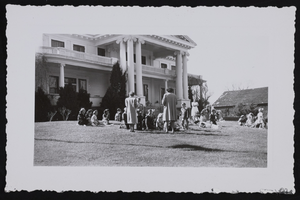
Easter party: photographic print
Date
1951-09-17
Description
Easter party at the Governor's Mansion for children from the orphans' home
Image
Pagination
Refine my results
Content Type
Creator or Contributor
Subject
Archival Collection
Digital Project
Resource Type
Year
Material Type
Place
Language
Records Classification

